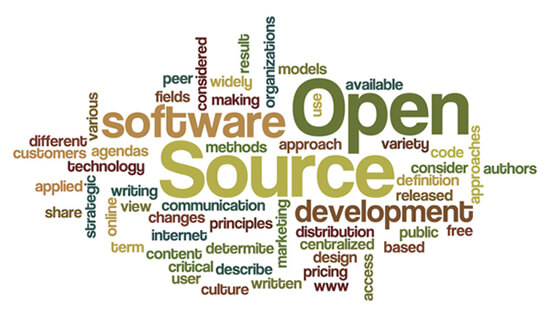Software and hardware today is more accessible than it has ever been. Small businesses, being on the front line, must find ways to leverage time and resources not only for profit increases but for survival itself.
Technology offers excellent ways to increase productivity, devise management systems and streamline operations.
Open Source Software
Open source software is one of the greatest gifts. The communities surrounding the thousands of free open source apps and utilities is attractive to those looking to use some kind of existing framework to build upon.
A solid premade underlying baseline for creating new digital products is the route many developers prefer today.
If you’re building a website you do not have to spend time creating it from scratch. It is very rare for a developer to write code by hand when there are dozens of trusted content management systems including WordPress, Joomla! and Drupal.
It’s hard to remain competitive if you’re spending unnecessary amounts of time on small tasks.
With a framework, essentially, you embellish upon an existing template and use it freely with redistribution rights.
WordPress is among the best examples of open source software and is a powerful tool. It’s more than a tool, it’s a weapon!
You’ll find not only video channels, podcasts, courses, blogs and websites dedicated to WordPress, but live conferences and meet ups with keynote speakers.
With some creativity and imagination, it’s possible to get open source and free apps to do things their paid counterparts do.
Just don’t assume open source simply means free. It doesn’t, not always.
- Open source gives you redistribution rights under the Creative Commons licenses.
- You can take a piece of software and access the API (like WordPress) to change it.
- Plain old “free” software in the conventional sense usually means you get what you’re given and cannot reprogram, recode or reverse engineer any of it.
Proprietary Software
Some of my tools are paid for, and I consider it money well spent. When it comes to paid/proprietary software, you need to ask yourself what the free alternatives are and do a cost analysis.
The important question is whether the free tool you use will be around long term?
Sometimes, free apps and software get bought out by another company who then decide to change the terms. If your business tech strategies are sensitive to disruption, and you’re relying on a tool you have not paid for, this could become an issue.
One broken link in the chain can cause the house of cards to collapse.
Examples:
- If you’ve built a “free” website, the company you’re getting your website from might be at the mercy of boardroom deals, mergers and buy outs. When third parties who do not care about you restructure it’s possible you’ll have your “free” site uprooted. I’ve seen it happen!
- If you’re using a free social media app for a logistical purpose what would happen if it disappeared? Are free apps acting as vital links in a software supply chain you’ve set up? The phrase “building a house on rented land” springs to mind. I’ve seen lots of Twitter apps disappear when the API updates the developer policies.
Here’s my warning: Please do not get into a situation where your business is jerry-rigged with uncertain/unreliable software solutions. When you buy something from a provider, your relationship is totally different with the entity compared to if you were using a free alternative from the same provider.
Sometimes it is worth coughing up the money for paid software. You’ll get better customer support when there might have been none with the free alternative you were using.
Mixing It Up
Most people combine free software with paid software. WordPress plugins are a good example of this. This is fine as long as you understand your position.
Let me give you an example: At the moment, I am using a WordPress plugin called Duplicator. While it is good, I’ve had problems and instability in the past. This is why I’ve also used BackUpBuddy, which is paid for. If Duplicator craps itself, I know I can take out a new subscription for BackUpBuddy and avoid headaches.
It’s normal to end up with a vast, extended family of tools you didn’t exactly expect. Like all families, there can be friction and disagreements.
For this reason, I use Adobe Illustrator with Photoshop and InDesign whereas some designers will insist on Corel Draw.
Brands like Apple are notorious for ring fencing their products and grooming a captive market who cannot easily use outside software with their Apple product.
I’m glad to say this is changing a bit, what with Microsoft releasing their Office suite for iOS devices. This is a good sign!
To avoid problematic situations I’ll always seriously evaluate exactly what tools I’m using for design, marketing and logistics. I always definitely consider paying subscriptions for good software without headaches.
Hardware
Hardware very rarely comes free but even then, opportunities to purchase perfectly good second hand gadgets exist in the global market place.
For example, the iPhone 4s is an older generation phone and can be bought as a refurbished product. It can still do what you need it to do without a ridiculous price tag. Just watch out for counterfeits.
Go on eBay and see what you can find refurbished. Alternatively, the Apple store sell refurbished iPads if you’re concerned about independent sellers distributing through online marketplaces.
Sometimes I’ll gladly purchase new hardware, like when I paid full price for a 2TB USB3 external HDD. Not only is it under warranty but also a totally worthwhile investment for the amount of valuable data I have.
Posts About Technology
Pssst! 16 Sneaky Snooping Tools for Spying on Competitors
Resize Your Phone SIM Card: Free Printable Cutting Guide (PDF)
Google Calendar Retiring SMS Notifications – iOS Calendar Picking Up the Slack
How I Use My iPhone and Google Calendar SMS for Social Media Reminders
How I Digitise & Back Up My Expenses with an External USB Drive
A List of All My Hardware/Software Tools








Thanks for sharing your amazing content.
I myself am a developer and love writing and exploring about open source technology, this small piece which I just read was brilliantly curated and explains open source technology in simple words